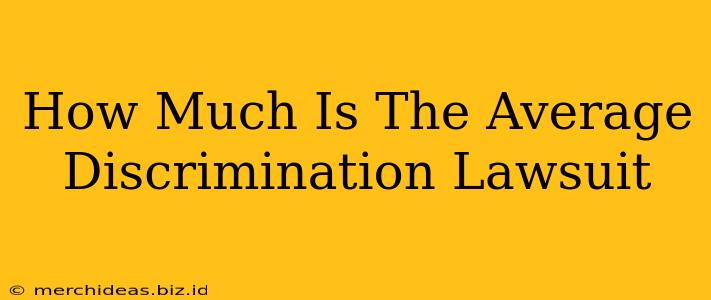Discrimination lawsuits can be complex and emotionally draining, leaving many wondering about the potential financial outcomes. The question, "How much is the average discrimination lawsuit?" doesn't have a simple answer. The amount awarded varies dramatically depending on numerous factors. This article will delve into these factors, offering insights into potential settlements and verdicts.
Factors Affecting the Value of a Discrimination Lawsuit
Several key factors significantly influence the potential payout in a discrimination lawsuit:
1. Type of Discrimination:
The type of discrimination plays a crucial role. Cases involving racial discrimination, gender discrimination, age discrimination, religious discrimination, or disability discrimination can all lead to different outcomes. Cases involving more severe forms of discrimination, like those involving hate crimes, tend to result in higher settlements or verdicts.
2. Severity of the Harm:
The extent of the harm suffered by the plaintiff is a critical factor. This includes:
- Economic Damages: Lost wages, benefits, and future earning potential are all considered. The longer the period of discrimination, the higher the potential economic damages.
- Emotional Distress: The plaintiff's emotional suffering, including anxiety, depression, and humiliation, is often a significant component of the damages. Evidence such as medical records and testimony from therapists can strengthen claims for emotional distress.
- Punitive Damages: These are intended to punish the defendant and deter future discriminatory behavior. They are awarded only in cases where the defendant's actions were particularly egregious or malicious. The availability of punitive damages varies by state and jurisdiction.
3. Strength of the Evidence:
A strong case built on solid evidence significantly increases the chances of a favorable outcome. This evidence might include:
- Witness Testimony: Statements from colleagues, supervisors, or clients who witnessed the discriminatory behavior.
- Emails and Documents: Written communication that reveals discriminatory attitudes or actions.
- Performance Reviews: Evaluations that may reflect biased treatment.
- Statistical Data: Evidence demonstrating a pattern of discrimination against a protected group.
4. Jurisdiction:
State and federal laws vary, impacting the potential recovery in a discrimination lawsuit. Some jurisdictions are more plaintiff-friendly than others, potentially leading to higher settlements or verdicts. The specifics of state and federal laws regarding discrimination will directly affect how a case is handled and what damages may be awarded.
5. Settlement vs. Verdict:
Many discrimination cases settle out of court. Settlements can often be reached more quickly and with less expense than going to trial. However, the amount of a settlement depends on negotiations between both parties and their legal teams. A trial, on the other hand, involves presenting evidence to a judge or jury, who will then determine the amount of damages.
Average Settlement and Verdict Amounts: A Cautious Perspective
While pinpointing an exact average is impossible due to the variability described above, it's safe to say that successful discrimination lawsuits can result in settlements or verdicts ranging from thousands to millions of dollars. Cases with significant economic damages and compelling evidence of severe emotional distress or malicious intent are most likely to result in higher awards.
It is crucial to understand that these figures are not averages in the traditional sense. The wide range reflects the unique circumstances of each case. Consulting with an experienced employment lawyer is vital to understanding the potential value of your specific claim. They can analyze your case, assess the evidence, and provide a more accurate estimate based on your circumstances and the applicable laws.
Finding the Right Legal Representation
Navigating the complexities of a discrimination lawsuit requires skilled legal counsel. An attorney specializing in employment law will possess the expertise necessary to build a strong case, negotiate a favorable settlement, or present your case effectively in court. Don't hesitate to seek out multiple consultations before making a decision. Remember, the right legal representation can significantly influence the outcome of your case.
This information is for educational purposes only and should not be considered legal advice. Consult with an attorney for advice tailored to your specific situation.
